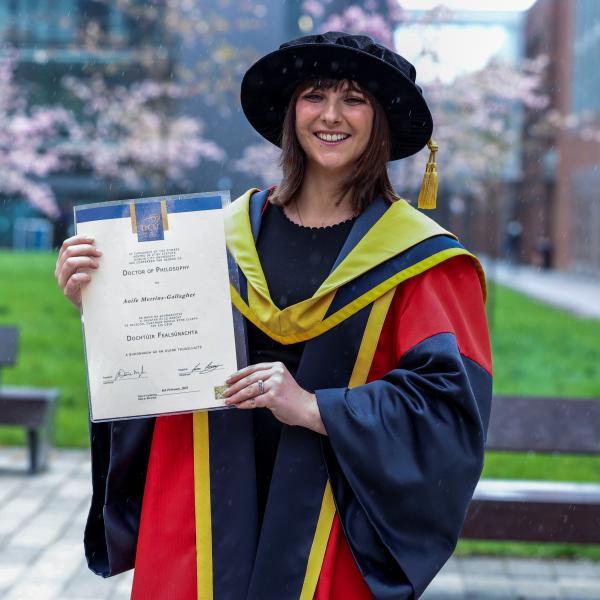Aoife Merrins-Gallagher

For most people, taking on challenges like building your own house, or completing a PhD are achievements of a lifetime. Aoife Merrins-Gallagher did both at the same time. But she insists that her self-build project was the thing that helped her complete her doctorate.
Aoife’s research explored new approaches, in an Irish context, to supporting junior primary school children with English as an Additional Language (EAL). For these students, English is generally not spoken at home, meaning that they can struggle with language skills in class. The research led to the development of ‘Tell-a-Tale | Inis Scéal’, a programme designed to develop oral language skills of children in ‘linguistically diverse’ classrooms.
Her journey to this PhD research began after she qualified from DCU as a primary school teacher and was working in a school in west Dublin which had a large proportion of students learning English as an Additional Language (EAL). “So, when I say linguistically diverse, I'm talking about classrooms with pupils who speak alternative languages at home, and we would have had many children who spoke alternative languages in our school. Yet, I found that, as a newly qualified teacher, I was very ill-equipped to support these kids.”
She later pursued a Master’s in DCU, which involved a project which explored the collaborative teaching of oral language skills using storybooks. “We just wanted to target the oral language skills of learners with English as an Additional Language, and in particular their contribution to discussions around stories, because that was something that I noticed they weren't very forthcoming with, I suppose, during my own whole-class discussions. I just felt more needs to happen here to support the language skills of these young learners, and that then was the seed for my PhD Research.”
In 2018, Aoife applied for the DCU-INTO 150 PhD scholarship - an award to celebrate 150 years of the INTO primary teachers’ union. She believes the relevance of her research proposal was important to her being awarded this funding. “I couldn't understand how we could have an education system where one in every 10 children speaks another language at home, and yet, we didn't have the supports in place for them or their teachers.”
Aoife’s PhD research involved working with teachers in linguistically diverse classrooms, across Leinster and Connacht, to support the oral language skills of EAL students. Her field work was conducted during the pandemic and followed lengthy school closures. Aoife was pleasantly surprised by the enthusiasm of teachers for her project during such trying circumstances. “So, in place of having three classes participating in my main study, I ended up having six, and I just think that's such a testament to primary school teachers out there and their commitment to wanting to do something to explicitly support learners of EAL.”
Pursuing a PhD was not without its challenges, in particular the solitary nature of doctoral study. Her advice to others is to “find your tribe” of fellow PhD students, “because you go from being in the school community, interacting with parents, children, and colleagues, to then suddenly being on your own, in your own space, and doing endless readings on your laptop, so you're not accessing all those other skills that you'd use in a social world. Having that tribe was really just the bedrock for me in terms of getting over the finish line.” She says staff at DCU Institute of Education, like her primary supervisor Dr Gillian Lake, helped to facilitate a sense of community through the faculty’s fortnightly Research in Progress Seminars.
Her advice for those considering a PhD is to make sure you are passionate about your topic. “It's going to be what you live, sleep and breathe for the next three or maybe more years. If you're going to go full time, I would say treat it like a day job, because it's very easy to let it filter into your personal life. You need to create clear boundaries between your PhD and your own personal life.”
In Aoife’s case, her personal life involved building a new house with her husband during her free time. “At the weekends, I was doing build-related stuff, and I know that might not sound like much of a break, but I loved it, because to me it felt like we were setting the foundations for life beyond the PhD. We were building a future for ourselves.” She adds that doing “direct labour” on the site gave her some welcome exercise after a week spent at her desk.
Following her graduation, Aoife has returned to teaching. Currently, she works in a new role as a Special Education Teacher and enjoys applying her research in a school setting to help students who are struggling with oral language, comprehension and spelling. “I've built up this skill set for knowing how to do interventions, and knowing how to do them effectively…. I'm bringing those research skills back into practice, and I have a lot more confidence in my work now as a teacher.”
Aoife Merrins-Gallagher was awarded a PhD in Philosophy in DCU.
